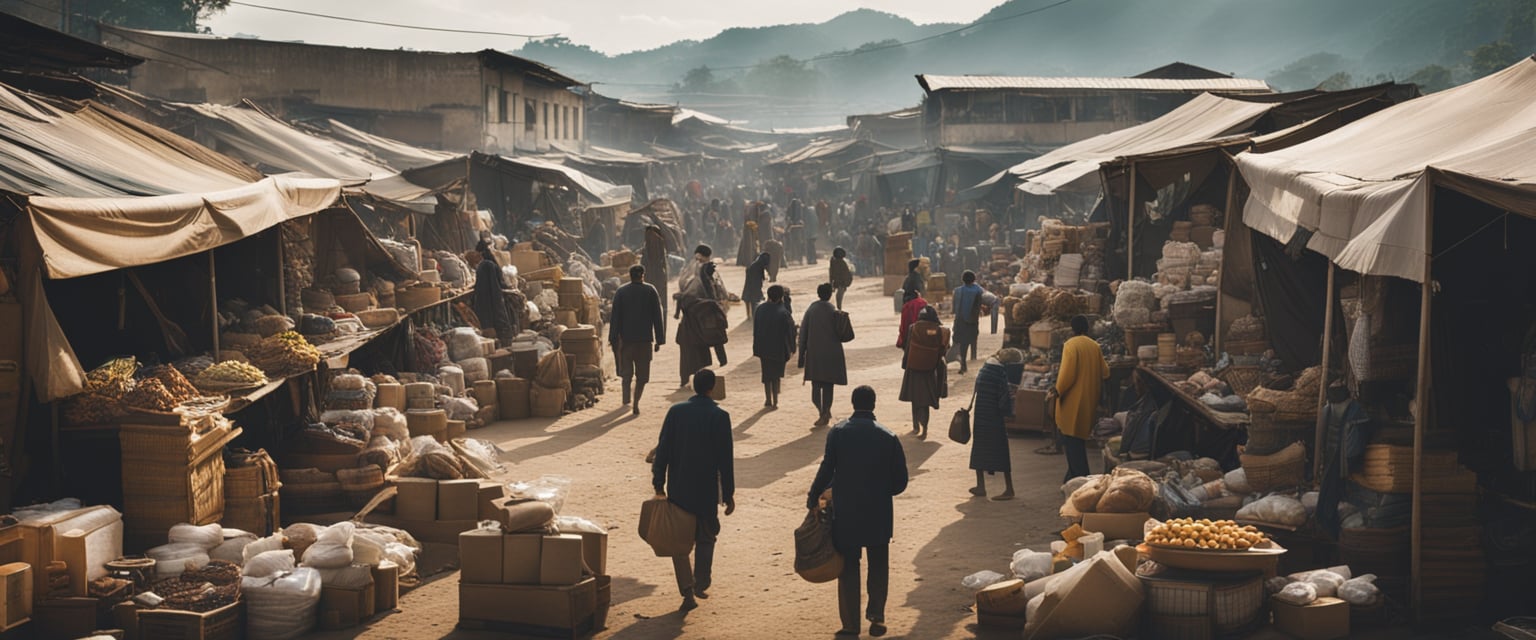
Survival bartering is a skill that has been used for centuries, and it remains an essential skill to have in today’s world. In times of disaster or economic collapse, paper currency can become worthless, and bartering becomes the norm. Therefore, it is crucial to be prepared and have the necessary resources to trade.
To effectively barter, you need to understand the fundamentals of post-disaster bartering. You need to know what items are valuable and in demand, and what items are not. Items that we take for granted today, such as batteries or toilet paper, could become the new currency tomorrow. Therefore, preparation and resources are key to successful bartering.
Effective trading strategies are also essential to successful bartering. You need to be able to negotiate effectively and understand the value of the items being traded. Knowing when to trade and when to hold onto your resources is also critical. Additionally, bartering safety and ethics should be considered to ensure a fair and safe trading environment.
Key Takeaways
- Understanding the fundamentals of post-disaster bartering is essential.
- Preparation and resources are key to successful bartering.
- Effective trading strategies and bartering safety and ethics are critical to ensure a fair and safe trading environment.
Fundamentals of Post-Disaster Bartering
Understanding Barter Economy
In a post-disaster economy, bartering is a common way of trading goods and services. Bartering is the exchange of goods or services without the use of money. In a barter economy, the value of goods and services is determined by supply and demand. The value of goods and services can vary widely depending on the situation and the needs of the parties involved.
Essential Bartering Skills
To be an effective barterer, there are several skills you need to develop. These skills include:
Negotiation: Negotiation is a critical skill in bartering. You need to be able to negotiate effectively to get the best deal possible.
Communication: Good communication is essential in bartering. You need to be able to communicate clearly and effectively to ensure that both parties understand the terms of the trade.
Valuation: Valuation is the process of determining the value of goods and services. You need to be able to value goods and services accurately to ensure that you get a fair deal.
Networking: Networking is important in bartering. You need to be able to build relationships with other barterers to ensure that you have access to a wide range of goods and services.
Creativity: Creativity is important in bartering. You need to be able to come up with creative solutions to problems and be willing to think outside the box to get what you need.
In summary, bartering is a critical skill in a post-disaster economy. To be an effective barterer, you need to develop essential skills such as negotiation, communication, valuation, networking, and creativity. With these skills, you can effectively trade goods and services and ensure that you get the best deal possible.
Preparation and Resources
When it comes to survival bartering in a post-disaster economy, preparation is key. You need to gather tradeable goods and determine their value to ensure you have the resources necessary to trade for what you need. Here are some tips to help you prepare for effective trading:
Gathering Tradeable Goods
The first step in preparing for survival bartering is to gather tradeable goods. You should focus on items that are essential for survival, such as food, water, shelter, and medical supplies. Other useful items include tools, clothing, and fuel.
When gathering tradeable goods, it’s important to consider their durability and shelf life. You don’t want to stock up on items that will expire or deteriorate over time. Instead, focus on items that have a long shelf life and are durable enough to withstand harsh conditions.
Determining Item Value
Once you have gathered tradeable goods, you need to determine their value. This can be tricky, as the value of items can vary depending on the situation and the needs of the person you are trading with.
One way to determine the value of items is to use a bartering chart. This chart lists common items and their approximate values in a post-disaster economy. For example, a gallon of water might be worth a can of food or a box of matches.
Another way to determine item value is to observe the market. Pay attention to what items are in high demand and what items are in low supply. This will give you an idea of what items are valuable and what items are not.
By gathering tradeable goods and determining their value, you can prepare yourself for effective survival bartering in a post-disaster economy. Remember to focus on essential items with long shelf lives and to stay aware of the market to determine item value.
Effective Trading Strategies

Negotiation Techniques
When it comes to survival bartering, negotiation skills are essential. You need to be able to negotiate effectively to get the best deal possible. Here are some negotiation techniques that can help you:
Know your worth: Before entering into any negotiation, it’s important to know the value of the item or service you’re offering. This will help you negotiate from a position of strength.
Be patient: Negotiations can take time, so it’s important to be patient. Don’t rush the process or you may end up settling for less than you deserve.
Listen actively: When negotiating, it’s important to listen to the other person’s needs and concerns. This will help you understand their perspective and find a mutually beneficial solution.
Be flexible: Negotiation is all about finding a compromise. Be willing to be flexible and make concessions to reach a deal.
Building Trust and Relationships
Building trust and relationships is crucial in survival bartering. Here are some tips to help you build trust and relationships with potential trading partners:
Be honest: Honesty is the foundation of any successful relationship. Be upfront about what you have to offer and what you’re looking for in return.
Communicate clearly: Clear communication is key to building trust. Make sure you’re both on the same page about the terms of the trade.
Follow through on your promises: If you promise to deliver something, make sure you follow through. This will help build trust and establish a positive relationship.
Be respectful: Treat others with respect and kindness. This will help build a positive relationship and make future trades more likely.
By using these effective trading strategies, you can increase your chances of success in post-disaster economies. Remember to be patient, flexible, and honest, and you’ll be well on your way to building strong trading relationships.
Bartering Safety and Ethics

Avoiding Common Pitfalls
When it comes to bartering in a post-disaster economy, it’s important to be aware of common pitfalls that could put you at risk. One of the biggest risks is trading with strangers, as you never know who you’re dealing with. To avoid this, try to establish relationships with other traders and build a network of trusted contacts.
Another common pitfall is trading items that are of little value to others. It’s important to have a good understanding of what items are in demand and what people are willing to trade for them. You should also be aware of the value of the items you’re trading and make sure you’re not getting ripped off.
Ethical Considerations
Ethics is an important consideration when it comes to bartering in a post-disaster economy. It’s important to be fair and honest in all your dealings, and to avoid taking advantage of others who may be in a vulnerable position.
One ethical consideration is the issue of hoarding. While it’s natural to want to stockpile items for your own survival, it’s important to remember that others may be in need as well. You should be willing to share your resources with others and avoid hoarding items that are in short supply.
Another ethical consideration is the issue of price gouging. While it’s tempting to charge high prices for items that are in high demand, it’s important to remember that this can be seen as exploitative and unfair. You should strive to charge fair prices for your items and avoid taking advantage of others who may be in a desperate situation.
By being aware of these common pitfalls and ethical considerations, you can engage in bartering safely and ethically in a post-disaster economy.
Long-Term Bartering Considerations

When it comes to long-term survival bartering, it’s important to consider sustainable trading practices and community bartering systems.
Sustainable Trading Practices
In a post-disaster economy, resources may be scarce, and it’s crucial to practice sustainable trading to ensure long-term survival. This means that you should only trade items that you can afford to part with, and that won’t negatively impact your long-term survival.
For example, if you have a limited supply of antibiotics, it’s not sustainable to trade them all away for short-term gains. Instead, consider trading a portion of your supply for other essential items that you need, such as food or water filtration systems.
Additionally, it’s important to consider the long-term sustainability of the items you’re trading for. For example, if you’re trading for seeds to grow your own food, make sure they’re non-GMO and heirloom varieties that can be saved and replanted year after year.
Community Bartering Systems
In a post-disaster economy, community bartering systems can be a valuable resource for long-term survival. By working together with your community, you can create a system of bartering that benefits everyone and ensures that essential items are distributed fairly.
To create a community bartering system, start by identifying the essential items that everyone needs, such as food, water, and medical supplies. Then, work together to pool your resources and trade items based on their value and scarcity.
It’s important to establish rules and guidelines for your community bartering system to ensure that everyone is treated fairly and that resources are distributed equitably. For example, you may want to establish a system of credits or tokens that can be earned through work or other contributions to the community, and then used to trade for essential items.
By practicing sustainable trading practices and establishing a community bartering system, you can ensure long-term survival in a post-disaster economy.
Frequently Asked Questions

What items are most valuable for bartering in a post-disaster economy?
In a post-disaster economy, items that are essential for survival and difficult to obtain will be the most valuable for bartering. These can include food, water, medical supplies, and ammunition. Other valuable items may include tools, clothing, and fuel.
How does hyperinflation affect the types of goods used for bartering?
Hyperinflation can cause the value of currency to plummet, making it nearly worthless. In this scenario, people will begin to rely on bartering for goods and services. The types of goods used for bartering may shift from luxury items to essential items, as people focus on survival.
Can you provide examples of unconventional items that may become important in survival bartering?
Unconventional items that may become important in survival bartering include seeds, alcohol, cigarettes, and even skills like medical knowledge or carpentry. These items may not seem valuable in everyday life, but in a post-disaster economy, they can become highly sought after.
What are the top everyday items that could become essential in a barter-based economy following hyperinflation?
Everyday items that could become essential in a barter-based economy following hyperinflation include hygiene products like soap and toothpaste, as well as basic household items like batteries, matches, and candles. These items may not seem valuable in everyday life, but in a post-disaster economy, they can become highly sought after.
Why might bartering be more successful in smaller, post-apocalyptic communities?
Bartering may be more successful in smaller, post-apocalyptic communities because people are more likely to know and trust each other. In a small community, people are more likely to have a sense of responsibility towards each other and may be more willing to help each other out in times of need.
What are the limitations of bartering, and why might it be less effective in certain situations?
The limitations of bartering include the difficulty of finding someone who has what you need and wants what you have, as well as the challenge of determining the value of goods and services. In certain situations, bartering may be less effective if there is a lack of trust between people or if there is a large power differential between those who have goods and those who do not.

Leave a Reply